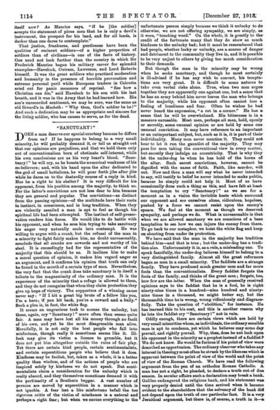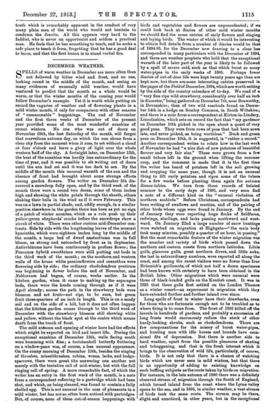" SANCTUARY !"
DOES a man deserve our special courtesy because he differs from us ? If he happens to belong to a very small minority, he will probably demand it, or tell us straight out that our opinions are prejudices, and that we hold them only out of conventionalism born of obstinate self-interest, while his own conclusions are as his very heart's blood. "Sanc- tuary!" he will cry, as he boasts the numerical weakness of his co-believers; and, with his hand upon the altar dedicated to the god of small battalions, he will pour forth jibe after jibe while he dares us to the dastardly course of a reply in kind. Has he a right to his shelter ? It is very difficult for his opponent, from his position among the majority, to think so. For the latter's convictions are not less dear to him because they are general and popular. The convictions—as distinct from the passing opinions—of the multitude have their roots in instinct, in conscience, and in long tradition. When they are violently assailed a man is apt to feel as though his spiritual life had been attempted. The instinct of self-preser- vation renders him fierce. He would like to do battle with his opponent, and when he sees him trying to take sanctuary his anger very naturally cools into contempt. He was willing to argue with a crank, but the refusal of the man in a minority to fight fairly makes him, no doubt unreasonably, conclude that all cranks are cowards and not worthy of his steel. It is exceedingly bad for the representative of the majority that this should be so. It inclines him to make a moral question of opinion, it makes him regard anger as an argument, and it confirms his opinion that truth can only be found in the month of a certain type of man. Nevertheless, the very fact that the crank does take sanctuary is in itself a tribute to the magnanimity of the ordinary man. It is the experience of the minority that a refuge is allowed to them, and they do not recognize that when they claim protection they give up hope of victory. The supporters of a winning cause never say "If I hit a great big brute of a fellow like you, I'm a hero; if you hit back, you're a coward and a bully." Such a plea is, in fact, the white flag.
It seems an ungracious task to accuse the unlucky, but these, again, cry " Sanctuary !" more often than seems quite fair. A man may have lost all his money through no fault of his own, and yet be the most disagreeable man alive. Mercifully, it is not only the beat people who fall into misfortune, though really it sometimes seems like it. Ill. luck may give its victim a licence to grumble, but it does not put him altogether outside the rules of fair play. Yet there are certain kind people, certain sentimentalists, and certain superstitious people who believe that it does. Kindness may be foolish, but, taken as a whole, it is a better quality than wisdom, and of the actions of people who are inspired solely by kindness we do not speak. But senti- mentalists claim a consideration for the unlucky which is really absurd, and they themselves sometimes demand it with the pertinacity of a Southern beggar. A vast number of persons are moved by superstition in a manner which is not ignoble. A fear lest a like misfortune befall the too rigorous critic of the victim of mischance is a natural and perhaps a right fear ; but when we excuse everything to the unfortunate person simply because we think it unlucky to do otherwise, we are not offering sympathy, we are simply, as it were, "touching wood." On the whole, it is greatly to the credit of the fortunate many that they do show so much kindness to the unlucky bad; but it must be remembered that bad people, whether lucky or unlucky, are a source of danger and detriment to the community they live in, and it is possible to be very unjust to others by giving too much consideration to their demands.
But though the man in the minority may be wrong when he seeks sanctuary, and though he most certainly is ill-advised if he has any wish to convert, his tempta- tions are very great. It is difficult to some natures to take even verbal risks alone. True, when two men argue together they are apparently one against one, but a sense that he has an army behind him never leaves the man who belongs to the majority, while his opponent often cannot lose a feeling of loneliness and fear. Often he wishes he had never heard the expression, "a rat in a corner." He has a sense that he will be overwhelmed. His bitterness is in a measure excusable. Most men, perhaps all men, hold, openly or secretly, some unusual opinion or are held by some one unusual conviction. It may have reference to an important or an unimportant subject, but, such as it is, it is part of their individuality. Many men never mention it. They could not bear to let it run the gauntlet of the majority. They may pass for men takiug the conventional view in every matter, but secretly they indulge an eccentricity. That is why they let the under-dog be when he has hold of the horns of the altar. Such secret convictions, however, cannot be dignified with the name of faith. Faith, like murder, will out. Now and then a man will say what he never intended to say, will testify to belief he never intended to make public, because he simply could not help it. Most of us have occasionally done such a thing as this, and have felt at least the temptation to cry "Sanctuary!" as we see for a moment as in a vision the invisible hosts which surround our opponent and see ourselves alone, ridiculous, hopeless, pushed by a force we cannot resist upon the enemy's spears. We feel at the moment as though we deservei sympathy, and perhaps we do. What is unreasonable is that when we are allowed sanctuary we are conscious of a base temptation to see how we can injure the enemy from there. To go back to our metaphor, we hoist the white flag and keep on shooting from under its protection.
We have said that the man in the majority has tradition behind him—and that is true ; but the under-dog has a tradi- tion also. Unfortunately it is, as a rule, a misleading one. To speak fancifully, the under-dog believes himself to belong to a very distinguished family. Almost all the great reformers began as men in a small minority. The faddists are a strange family. They have produced much greater men and far more fools than the conventionalists. Every faddist forgets the fools of the family, and thinks of the great men ; forgets, too, how few are the latter. When the man of generally received opinions says to the faddist that he is a fool, he is right ninety-nine times in a hundred—nine hundred and ninety- nine times in a thousand, we might better say, but the thousandth time he is wrong, wrong ridiculously and disgrace- fully. Take the question of "abolition," for instance. He has learned this to his cost, and this is another reason why be lets the faddist cry " Sanctuary !" not in vain.
Oddly enough, there are certain views which are held by very small minorities whom, as individuals, the ordinary sensible man is apt to condemn, yet which he believes may some day prevail, and rightly prevaiL Why, then, does he not look upon his opponent in the minority as a prophet instead of a faddist P We do not know. He would be furious if his point of view were described as opportunism. The ordinary observer who takes any interest in theology must often be struck by the likeness which is apparent between the point of view of the world and the point of view of the Roman Church. We have read the following argument from the pen of an orthodox Roman Catholic. A man has not a right, he pleaded, to declare a truth out of due season. In secular affairs such a declaration may break a bank. Galileo endangered the religious bank, and his statement was very properly denied until the time arrived when it became evident to the shareholders that the solvency of the bank did not depend upon the truth of one particular fact. It is a very Jesuitical argument, but there is, of course, a truth in it—a truth which is remarkably apparent in the conduct of very many plain men of the world who would not hesitate to condemn the Jesuits. All this appears very hard to the faddist, who is never an opportunist and seldom a practical man. He feels that he has something to teach, and he seeks a safe place to teach it from, forgetting that he has a good deal to learn, and that the first lesson is to stand verbal fire.



































 Previous page
Previous page